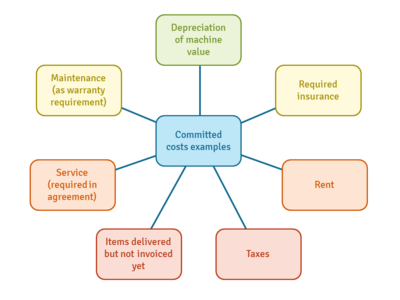Committed cost
| Committed cost |
|---|
| See also |
Committed cost is a kind of investment that a company or business organization has already made and couldn't recoup in any way. There are also obligations has made by the business, which cannot get back.
According to sentence "Committed costs are fixed future streams of expenditures. Within this definition are leases and other contracts (with suppliers, customers and employees), warranties, mortgages, and capital amortizations. Such commitments can reduce uncertainties of supply, eliminate some search costs, increase demand, deny opportunities to competitors, and lock in lower costs over the life of the commitment."(F. Phillips and R. Srivastava, 1993, p.2)
It is a fixed cost. '"Most costs are not inherently fixed or variable in nature. In management cuts the workforce because of a drop in demand, labor cost is variable; otherwise it is fixed." (R.L. Weil, M.W. Maher,2005, p. 183)
Committed costs are difficult to change for many reasons:
This type of costs is an extension of business strategy. A strategic plan is very important, because contains strategic decisions, which are impossible (or almost impossible) to change.
- Long - term orientation
Companies must pay fixed amounts in contracts. Otherwise, if they do not keep the contract, they are required to pay punishments.
- Operations
It is other reasons why changing committed costs are difficult. It is connected with logistic decisions, often hard to change.
Examples of committed costs
'"The first category, committed costs (including leases etc.), are nonrecoverable if the project fails. The second category (materials etc.), although possibly recoverable, are irreducible if the project proceeds. The collection of both categories might be called determined costs. "(F. Phillips and R. Srivastava, 1993, p.3) The committed cost is this type of costs which can't be excluded from net income (company's bottmline), frequently they are high-cost items (like a house or a car). We can distinguish the following types of fixed committed costs: rental of office space, purchase of the machine needed for the properly operation of the company, long term investment in company plans or maintaining key personnel. There are also all additional fees that result from the original purchase. All of these outgoings are indispensable to run a business and fulfill the set goals. Generally, these costs can not be reduced in any way.
Different between discretionary and committed costs
Discretionary fixed costs "are fixed costs that can be changed or avoided relatively easily at management discretion. For example, advertising is a discretionary fixed cost. It depends on the decision by management to purchase print, radio, or video advertising. This cost might depend on size of the ad or the number of times it runs, but it does not depend on the number of units produced and sold. Management can easily decide to increase or decrease money spent on advertising" (M. Mowen, D. Hansen, D. Heitger, 2009, p.84)
The difference between discretionary and committed costs depends on if can it be postponed and reduced in time or if the company is legally or otherwise associated with their recognition.
References
- Ang J.S., (1991), Small Business Uniqueness and the Theory of Financial Management
- Baumol W.J, Willig R.D, (2009), Fixed Costs, Sunk Costs, Entry Barriers, and Sustainability on Monopoly,
- Mowen M., Hansen D.,Heitger D., (2009) Cornerstones of Managerial Accounting, South - Western Cengage Learning, Mason
- Phillips F.,Srivastava R.,(2019) Committed Costs vs. Uncertainty in New Product Development,
- Weil R.L., Maher M.W,(2005) Handbook of Cost Management, John Wiley & Sons, New Jersey,
- Westhead P., Howorth C., (2016), Ownership and Management Issues Associated With Family Firm Performance and Company Objectives,
Author: Edyta Krzyczman
